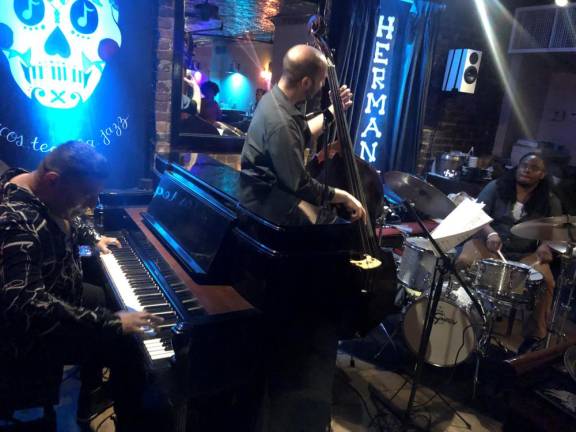The Pianist Shines at Hermana
A new East Village Mexican restaurant/jazz club reopens after the pandemic with a star turn by Benito Gonzalez

Towards the end of his glowing show last Friday night at Hermana, the essential East Village Mexican restaurant/jazz club, pianist-composer Benito Gonzalez rose from the bench, nodded to the crowd and jumped into “Smile,” the hopping song from his new album that conveys vital joy for this coronavirus year.
“It’s freedom and the voice of our community as individuals,” the Venezuela-born, Brooklyn-based musician says of his beatific latest record, “Sing to the World” (Rainy Days Records, 2021), before the show on the venue’s plant-lined patio. “It represents who we are and how we connect as human beings amidst what’s going on in the world.”
The mid-forties artist, who began playing piano at age twelve and has subsequently performed with such jazz masters as Pharoah Sanders while releasing a string of praised albums, laments the ills that plague New York — and the world — such as gun violence and the ongoing pandemic but deeply believes in the healing potential of music.
As a full moon shone above the bodegas and walk-ups of lower Manhattan, Gonzalez resoundingly proved his idea during a nearly four-hour-long concert of celebratory originals in a wonderfully intimate new club.
Conceived a few years ago by bar veteran John Adams, and having opened about a year ago as the coronavirus quieted the city, Hermana (Spanish for “sister”) still blasts as some of the world’s finest jazz musicians play under its silver-plated roof.
Adams, a lover of the genre down to his Louis Armstrong t-shirt and piano tattoo on his forearm, didn’t so much have a grand plan as he just wanted to give his musician friends a space to perform in the isolating hold of the virus.
“Everything shut down last summer and musicians needed a place to play,” the Buffalo-rooted Adams says of his establishment, which he owns with Michael Stewart of the cherished Tavern on Jane in the West Village. “Everyone was playing into cameras by themselves so it was one of the first places, I think, that opened to give cats a place to play with another human being in front of other human beings.”
Persevered and Reopened
Due to the uptick in coronavirus cases in the fall of 2020, though, he had to close Hermana for a few months. A workhorse operator who does everything for the space from running the website to cleaning tables, Adams still persevered and reopened this past Cinco de Mayo.
“I’ve been in the middle of it since day one and have been working pretty much every day, taking trains and riding around on these Revel scooters, and being in the public-facing service aspect of it the entire time,” he says.
One weekend night, when the original chef he hired didn’t show up, he even went into the kitchen himself and started making chicken wings (instead of the popular tacos), chips and guacamole. He said that Hermana has survived the virus largely by “being extra careful, taking all of the precautions, doing everything the way that we were advised to and being extremely sanitary.”
“A Cool Language”
With the steep reduction in coronavirus cases and low infection rate, Adams, along with his “rockstar” chef Andres Domingues, and small staff including Scott the Bartender, not only reemerged this past spring but have also featured such wondrous musicians as Gonzalez.
“What a cool language they’re speaking up there,” says the late-twenties Francesca of the pianist’s seamless ability to play with his trio rounded out by Will Slater on bass and Curtis McPhatter on drums. The East Village-dwelling attendee had never seen Gonzalez play before but she marvels at his deftness, how he heaves and hammers on the eighty-year-old Steinway, how his fingers fly across the keys like little devils as he plays the triumphant tracks from “Sing to the World.”
Over an hour long and containing standout songs like the cascading “Offering” and the searching “Visionary,” Gonzalez’s fifth album (following 2018’s celebrated “Passion Reverence Transcendence”) is a mid-career epic, the sound of a man surveying the years he’s led and charging towards those ahead with newfound fervor.
Pieces such as the florid “Views of the Blues” and the bursting title track show Gonzalez to hear the world’s chaos yet still seeking — and often finding — its beauty. Aided by the stellar Christian McBride on bass, drum king Jeff “Tain” Watts, and the trumpeter Nicholas Payton (amongst other treasured instrumentalists), the pianist even evokes his revered forebear, McCoy Tyner.
Like the great departed musician, who played on several John Coltrane albums including the transcendent “A Love Supreme” (1965) and whose own “Sahara” (1972) is similarly questing, Gonzalez seeks bliss on “Sing to the World” and does so by imbuing his compositions with his own warmth.
Gonzalez’s verve radiates not only on such songs as the jubilant “Flatbush Avenue” or the ferocious “Colors” but also in his slamming on the keys, something he does now as the lights have dimmed and the audience stands rapt in John Adams’s Hermana.
Outside, cars screech and sirens blare but, for the moment, the man plays and merges with listeners just as he sought to in a space meant for such precious unity.